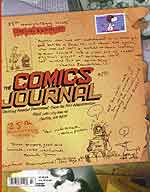 "The Comics Journal" 25th anniversary issue: #235, July, 2001
"The Comics Journal" 25th anniversary issue: #235, July, 2001 |
The "Journal"'s closest competition, the weekly "Comics Buyer's Guide" and monthly "Wizard" put their focus on comicbooks as a collectible commodity, with huge valuation charts taking up the bulk of pages. Hopelessly tied up with this volatile market, their editorial content works like the "fluffer" on pornographic film sets, trying desperately to keep the spent mainstream superhero books going for one more round. They perpetuate a view of the medium as a form of childish investment, a dead end, rather than a foil for adult, artistic expression with endless possibilities.
In 1976 Gary Groth and Mike Catron purchased the rights to a dying fanzine called "The Nostalgia Journal," and published it as "The New Nostalgia Journal." Soon renamed the "The Comics Journal," it began by publishing an expose of the sleazy dealings the publishers had with another fanzine owner. Unprecedentedly juicy for a "fan" magazine but way overlong and self-involved, the piece immediately established the contradictory nature of the "Journal" that continues to this day.
Since then the Newswatch section has mucked around in the unseemly secret history of the biz. Lately it has been essential reading to get the story behind the collapse of Stan Lee Media, the internet venture of the legendary Marvel editor. (One of the partners has since moved to Brazil while federal authorities seek to extradite him on securities fraud charges. Stan Lee has not been charged with any wrongdoing.) The "Journal"'s news section does excellent work, though it also has its weak spots. Since 1982 the company that publishes "The Comics Journal," Fantagraphics Books, has been publishing its own comicbook line, including many of the most significant titles of the last twenty years. Although there is no evidence of bias, the "Journal" cannot truly be called an independent news and criticism source.
Besides news, the "Journal" also provides comicdom's only source of serious critical discourse in print. Their exhaustive and exhausting interviews with all the most important creators in the field have no equal in length, if not always in revelation. Likewise the reviews are given the space for critical, in-depth analysis that more broad forums prohibit. Thanks to Editor-in-Chief Gary Groth, the "Journal" remains uniquely focused on the artistic merits of the medium.
For better and worse "The Comics Journal" without Groth would be like "Playboy" without Hef. Groth's cranky, anti-establishment-bordering-on-reactionary tone permeates the "Journal." He wrathfully loathes the majority of comics and will ask unwitting interview subjects questions like, "Why are you in favor of the production of more cretinous, illiterate drivel?" While this attitude creates an island of critical freedom against the crushing mainstream, it also isolates the magazine as elitist and intimidates the fence-sitters or casual readers. It signals "Stay Away!" to all but the most determined.
Anti-fan yet cultish; objective yet biased; professional yet amateurish; independent yet compromised; indispensable yet irrelevant: so goes "The Comics Journal." It feels like a work of conceptual art. The importance of its existence often overshadows its execution. Still, a serious artform deserves a serious critical outlet and for now the "Journal" is the best and only game in town.
"The Comics Journal" can be found at most comicbook stores and even, very sporadically, in magazine racks of large book and record stores. Back issues are often available at cover price.
Full Disclosure: "The Comics Journal" masthead lists me as contributor apparently because I have written two articles for them, the last of which appeared in 1997. Before that I had applied for a news writer position but was not selected.
